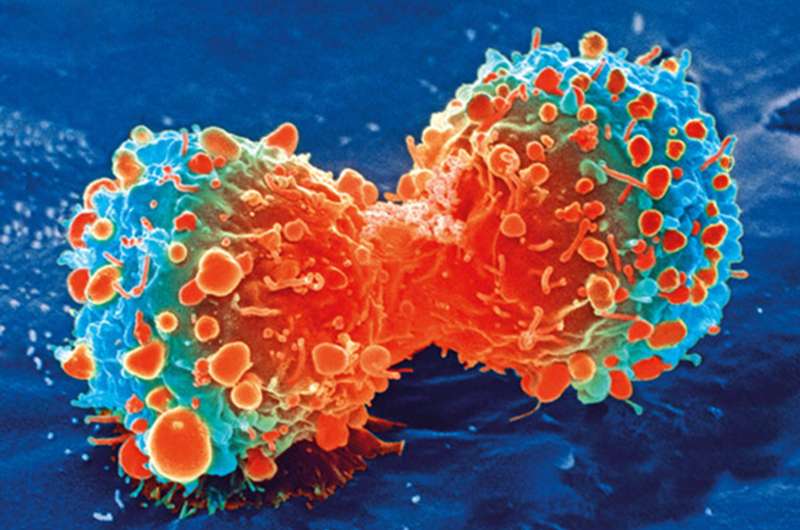Bowel cancer study reveals impact of mutations on protein networks

For the first time, scientists have completed a detailed study of many of the proteins in bowel cancer cells. Scientists from the Wellcome Trust Sanger Institute investigated the role proteins play in predicting how common mutations affect proteins in the cancer cells and also whether such proteins are important in predicting the cancer's response to treatment.
The results, published today (29 August) in Cell Reports give scientists a better picture of the cellular processes behind bowel cancer, and could enable researchers to predict which drugs would be effective in treating different bowel cancer patients.
Every day, 110 people are diagnosed with bowel cancer. There are around 41,300 new cases of the disease each year, and it is the fourth most common cancer in the UK.
To understand the biology underlying cancer, scientists have traditionally studied all of the cancer genes—the genome—and all of the RNA—the transcriptome—in the cancer. However, a blindspot in research has been the study of all of the proteins—the proteome—and it is the proteins that are the building blocks of cell machinery.
In the new study, scientists conducted a very deep, detailed study of the proteins in bowel cancer to investigate whether proteins play a role in predicting the effect of different drugs against the cancer. The researchers analysed 9,000 proteins for each of 50 bowel cancer cell lines.
Dr Jyoti Choudhary, lead author from the Wellcome Trust Sanger Institute and The Institute of Cancer Research, London, said: "This study is the first detailed characterisation of colorectal cancer cell lines. It is important to include the proteome in cancer research because proteins are the building blocks of life, and networks of proteins working together are known to drive fundamental processes in cancer. The proteome contains unique information on cell organisation and function. Just studying the genome and transcriptome in the past has proven to be a blindspot in cancer research—but now including the proteome, we have the full picture."
The team were able to construct co-ordinated networks of proteins that drive bowel cancer. Researchers used CRISPR-Cas9 to disrupt, or knock out, a single gene that encoded a key protein, and see the effects on the proteins in the rest of its network.
Dr Theodoros Roumeliotis, first author from the Wellcome Trust Sanger Institute, said: "We discovered that silencing one gene has consequences on the rest of the network, lessening the amount of other proteins—like a ripple effect. We have identified many pathways within the protein network that could be targeted with drugs for bowel cancer, which we could only discover by studying the proteome."
In the study, the team tested 265 existing anti-cancer drugs on the 50 bowel cancer cell lines. Details of the genome and transcriptome have previously been used to predict which drugs would work in particular cancer cases, however the activity of some drugs could not be predicted.
By studying the proteome the team could predict drug responses that weren't explained by either genomics or transcriptomics.
Dr Ultan McDermott, senior author from the Wellcome Trust Sanger Institute, said: "This study is promising for bowel cancer patients. It confirms that this common cancer is actually composed of five different subtypes that may require different drug treatments, and surprisingly suggests that proteins may be more predictive for drug sensitivity than we have previously thought. In the future we may need to test the patient's genome, transcriptome and proteome to fully predict their response to cancer drugs and stratify patients for clinical trials more effectively. We are moving away from one size fits all towards personalised medicine."
More information: Genomic determinants of protein abundance variation in colorectal cancer cells. Cell Reports (2017). DOI: 10.1016/j.celrep.2017.08.010














